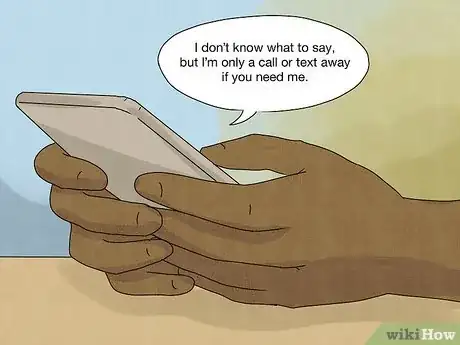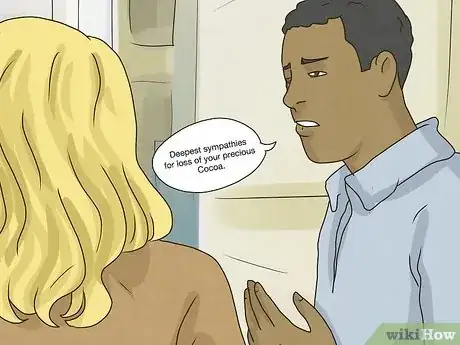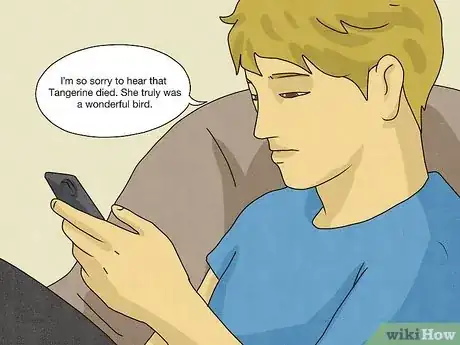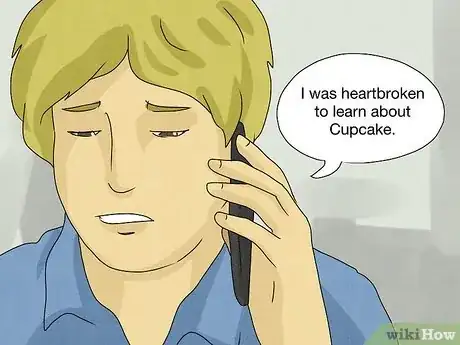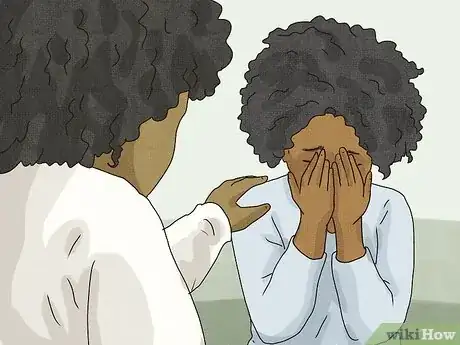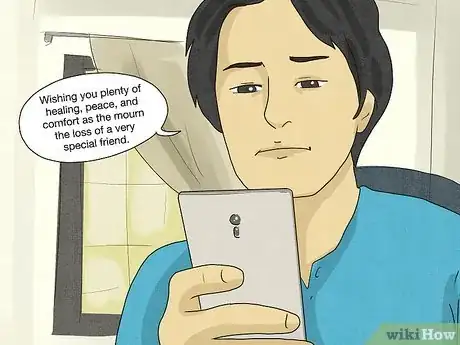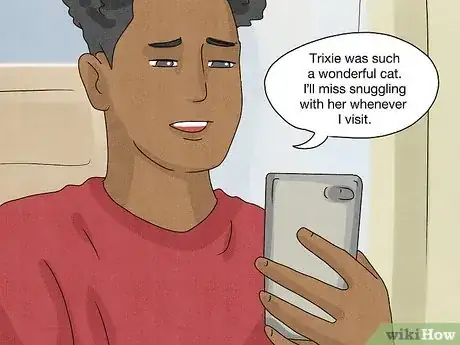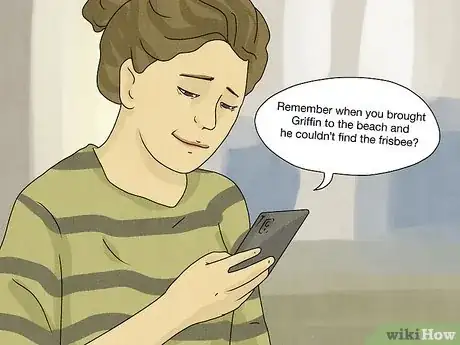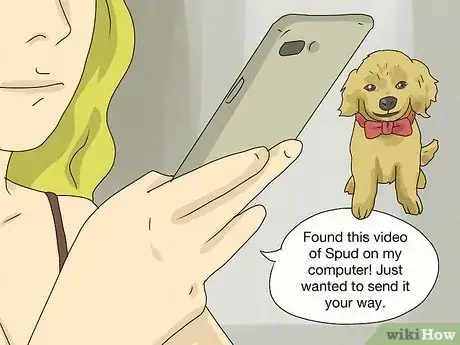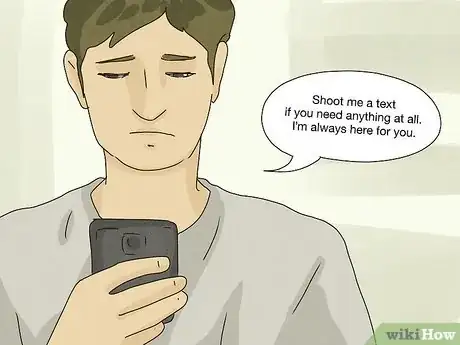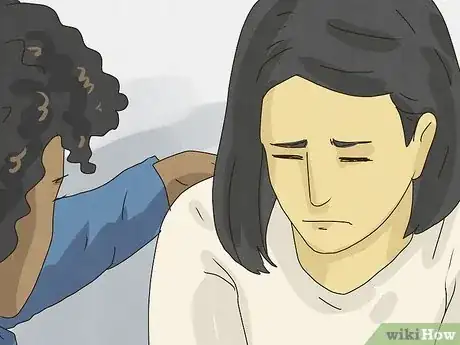This article was written by Adam Dorsay, PsyD and by wikiHow staff writer, Janice Tieperman. Dr. Adam Dorsay is a licensed psychologist in private practice in San Jose, CA, and the co-creator of Project Reciprocity, an international program at Facebook's Headquarters, and a consultant with Digital Ocean’s Safety Team. He specializes in assisting high-achieving adults with relationship issues, stress reduction, anxiety, and attaining more happiness in their lives. In 2016 he gave a well-watched TEDx talk about men and emotions. Dr. Dorsay has a M.A. in Counseling from Santa Clara University and received his doctorate in Clinical Psychology in 2008.
This article has been viewed 28,140 times.
Few things in life are as devastating as losing a beloved pet. When you know someone going through this tragic experience, how can you offer your support in the best way possible? Don’t worry—we’ve got your back. Read on for plenty of kind, caring ideas that you can include in your next conversation or sympathy card.
This article is based on an interview with our licensed psychologist, Adam Dorsay. Check out the full interview here.
Steps
“I’m so sorry for your loss.”
-
This simple statement is a great way to show your support. When you say “I’m so sorry for your loss,” you’re letting the other person know that you’re thinking about them during a really tough time. It’s a simple but effective way to remind the grieving individual that they’re not alone, and that you’re there for them.[1] X Trustworthy Source HelpGuide Nonprofit organization dedicated to providing free, evidence-based mental health and wellness resources. Go to source
- “Cam told me about what happened to Bear. I’m so, so sorry for your loss.”
- “Zoe was such a special kitty. I’m so sorry for your loss.”
- “I can’t even imagine what you’re going through right now. I’m so sorry for your loss, Caleb.”
- Some people worry that “I’m sorry for loss” is a cringey and cliche thing to tell a grieving individual, but this isn’t true at all. Grief is an incredibly personal and painful experience, and saying “I’m so sorry for your loss” is a simple but effective way to remind them that they’re not alone.
“I don’t know what to say, but I care about you a lot.”
-
It’s totally okay if you don’t know what to say during this tough time. Losing a pet is an incredibly heartbreaking experience, and there’s nothing you can say that will erase the immense pain and sorrow that the other person is feeling right now. Be honest that you don’t know what to say, and let them know you’re here for them if they need you.[2] X Trustworthy Source HelpGuide Nonprofit organization dedicated to providing free, evidence-based mental health and wellness resources. Go to source
- “I don’t exactly know what to say, but please know that I love and care about you a lot.”
- “I’m not totally sure what to say right now, but I want you to know that I’m here for you.”
- “I don’t know what to say, but I’m only a call or text away if you need me.”
“Deepest sympathies for the passing of dear Sally.”
-
This formal message shows that you’re taking their loss seriously. There’s absolutely nothing wrong with using a serious, more stoic greeting for the loss of a pet. “Deepest sympathies” and “my condolences” are really powerful ways to show your support both in person and in writing.
- “I’m so sorry to hear about Pancake. Please accept my deepest condolences.”
- “Deepest sympathies for the loss of your precious Cocoa.”
- “I was devastated to hear about Archie’s passing. You and your family have my deepest sympathies.”
“You’re in my thoughts.”
-
Treat this loss just like you would any other. Saying “you’re in my thoughts” reminds the grieving individual that their pain is real and valid and that they aren’t alone in the grieving process.
- “I’m so sorry for your loss, Dani. You and your family are in my thoughts.”
- “I’m so sorry to hear about what happened to Pepper. Please know that you’re in my thoughts.”
- “I was devastated to hear about your precious Checkers. You’re in my thoughts, Kelsey—sending you much love during this difficult time.”
“I heard that Jinx had to be put down.”
-
This type of statement gives the other person more room to share their feelings. By directly mentioning the pet’s death, you’re removing the “elephant in the room” and giving the other person the freedom to share what they’re going through.[3] X Trustworthy Source HelpGuide Nonprofit organization dedicated to providing free, evidence-based mental health and wellness resources. Go to source Giving the other person a chance to acknowledge and express their grief is a powerful and important part of the healing process.[4] X Trustworthy Source The Humane Society of the United States National organization devoted to the promotion of animal welfare Go to source
- “I heard that Lightning died. I’m so very sorry for your loss.”
- “I heard that Bones had to be put down yesterday. Please know that I’m here if you need to talk.”
- “I’m so sorry to hear that Tangerine died. She truly was a wonderful bird.”
“Daisy will be dearly missed.”
-
Saying their pet’s name out loud adds a personal touch to your message. Saying “I’m so sorry to hear about Harvey” sounds much more personal and supportive than “I’m so sorry to hear about your pet.” The grieving individual will appreciate the care and specificity in your message during such a tough time.
- “I’m so sorry to hear about Penny. She was such a good pig.”
- “I was heartbroken to learn about Cupcake.”
- “I’m so sorry for your loss. I’ll never forget all the fun times I had with you and Duncan.”
“Milo was lucky to have you as a pet parent.”
-
Acknowledge the relationship that the person had with their departed pet. The connection that people have with their pets is very personal; in many ways, it’s like being the parent of a furry, feathery, or scaly child. Validating the special relationship someone had with their pet is an important and valuable way to also validate their grief.
- “Dave was the best pet child that you could ever ask for.”
- “You were always such a good pet parent to Oreo.”
- “You were the best parent ever! Chunk was so lucky to have you.”
“Lola loved you so much.”
-
Let them know that they have nothing to feel guilty about. Some people feel super guilty and remorseful after putting their pet down—they worry that they made the wrong decision, or that their pet is “mad” at them. Sharing how much their pet loved and cherished them can be a comforting reminder that helps soothe those fears.[5] X Research source
- “Putting a pet down is an incredibly hard decision. You did what was best for Pickles, and I know he always loved you.”
- “Sandy was in a lot of pain. You made the right choice, and I know that she loved you until the very end.”
- “Please know that Truffle loved you so much, and wouldn’t want you to feel guilty about putting her down.”
“It’s never easy saying goodbye to a best friend.”
-
Acknowledge what an important role their pet played in their life. No pet is “just a dog” or “just a cat”—they’re an irreplaceable companion and friend. Putting a clear label on the relationship someone had with their pet is a great way to both acknowledge and validate their grief.
- “I’m so sorry for your loss. I know what a special bond you and Molly had.”
- “My heart breaks for you and your family. I know that Walter was your special buddy.”
- “Wishing you plenty of healing, peace, and comfort as they mourn the loss of a very special friend.”
“No dog was quite like Buddy. I’ll miss him terribly.”
-
Remind them that they’re not the only ones hurting during this tough time. Losing a pet can be an incredibly isolating experience as the pet owner feels like they’re the only one grieving. Sharing your sadness about the person’s departed pet can be super comforting and validating, and help the other person feel like they aren’t alone.
- “Trixie was such a wonderful cat. I’ll miss snuggling with her whenever I visit.”
- “I’m so devastated to hear about Sport. It always brightened my day when he ran across the yard to greet me.”
- “I was so sad to hear the news about Angel. She was such a sweet bunny, and I loved watching her hop around the room.”
“I remember the time I visited you and Max…”
-
Make them smile with a fun memory of their beloved pet. Sharing fun memories and stories is a touching and wholesome way to pay respects to a dearly departed animal friend. While these uplifting stories won’t erase the person’s grief, they definitely give them something to smile about during this tough time.[6] X Research source
- “Remember when you brought Griffin to the beach and he couldn’t find the frisbee?”
- “I’ll never forget the time that Purrsilla walked in front of your webcam during that video call…”
- “Remember that time we thought Roxie had escaped her cage, but she was really just hiding in the wood shavings? What a clever guinea pig.”
“I found this picture of Oliver…”
-
Honor their pet’s memory with a pleasant memento. Maybe you found some old pictures in your phone’s camera roll, or you found an old snapshot lying around your home. Send over the picture or video as a simple but powerful tribute to the person’s beloved pet.
- “Was looking through my phone and found this adorable pic of you and Patches.”
- “Found this video of Spud on my computer! Just wanted to send it your way.”
- “Look at this very special picture of a very special puppy.”
“Please know that I’m here for you.”
-
Offer a shoulder to cry on in case the person wants it. Some people may want to take time to themselves after losing a pet, while others might want to spend some time with other people. Give the grieving individual the power to decide what’s best for them by reminding them that they have your support.[7] X Research source
- “I totally understand if you want to be alone right now, but please know that I’m here if you need me.”
- “Shoot me a text if you need anything at all. I’m always here for you.”
- “I’m here if you need me, okay? Sending you lots of love.”
“Take whatever time you need to grieve and heal.”
-
Treat their grieving process the same as you would any other. Losing a pet isn’t something that a person gets over in a day, or even a week; in fact, it can take weeks and months before a person truly starts to heal and recover. Remind them that it’s okay to take plenty of time to grieve, and that there’s no rush for them “get better” and “move on.”
- “Honey was a really special lizard, and I know she meant a lot to you. Please take as much time as you need to grieve and heal.”
- “Fred wasn’t just a hamster—he was your buddy. Your feelings are so valid, and they deserve to be felt.”
- “Ace was a really important part of your life. Please take whatever time you need to mourn and heal from this incredible loss.”
“How is your life better for having known your pet?”
-
Allow them to reflect on the role that their pet played in their life. Pets often aren’t just our friends and soulmates—they also teach us valuable lessons about life. Let your grieving friend or loved one share what exactly their pet meant to them, and why the pet was such a special, irreplaceable part of their life. You might ask them if their pet helped them:
- Meet new people
- Recover from a painful break-up or loss
- Be more present
- Have a better mood
Warnings
- Steer clear of comments like “This is all part of God’s plan” or “You can always get another pet.” These statements tend to do more harm than good, and can seem hurtful and insensitive to someone who’s grieving.[10] X Research source⧼thumbs_response⧽
You Might Also Like
 17 Comforting Things to Say When Someone Passes Away
17 Comforting Things to Say When Someone Passes Away
 How to Write a Touching Obituary
How to Write a Touching Obituary

 What to Say When Someone’s Mom Dies
What to Say When Someone’s Mom Dies
 How to Clean a Gravestone: Gentle Ways to Remove Moss, Lichen, and More
How to Clean a Gravestone: Gentle Ways to Remove Moss, Lichen, and More
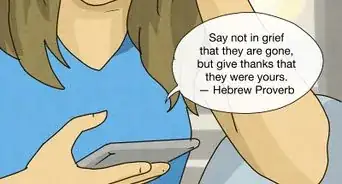 35+ Rememberance Messages for a Death Anniversary (Plus What Not to Say)
35+ Rememberance Messages for a Death Anniversary (Plus What Not to Say)





 15 Things to Say in a Pet Sympathy Card
15 Things to Say in a Pet Sympathy Card


References
- ↑ https://www.helpguide.org/articles/grief/helping-someone-who-is-grieving.htm
- ↑ https://www.helpguide.org/articles/grief/helping-someone-who-is-grieving.htm
- ↑ https://www.helpguide.org/articles/grief/helping-someone-who-is-grieving.htm
- ↑ https://www.humanesociety.org/resources/coping-death-your-pet
- ↑ https://www.psychologytoday.com/us/blog/animal-attachment/201703/6-ways-say-i-care-friends-who-are-facing-pet-loss
- ↑ https://www.psychologytoday.com/us/blog/animal-attachment/201703/6-ways-say-i-care-friends-who-are-facing-pet-loss
- ↑ https://www.jmu.edu/counselingctr/self-help/grief/helping-a-grieving-friend.shtml
- ↑ https://www.humanesociety.org/resources/coping-death-your-pet
- ↑ https://www.psychologytoday.com/us/blog/animal-attachment/201703/6-ways-say-i-care-friends-who-are-facing-pet-loss
About This Article


